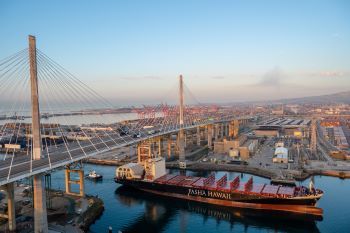The Port of Long Beach on Wednesday welcomed Pasha Hawaii’s MV George III, the first container ship powered by liquefied natural gas to refuel on the West Coast. The ship’s LNG-powered engines are dramatically cleaner than those of a traditional cargo ship.
Following George III’s inaugural visit to Long Beach, the newly built 774-foot-long ship will begin its maiden voyage to its home port in Honolulu. And there’s another LNG Pasha ship on the the way – the Janet Marie will be the second of two “Ohana Class” container ships to join Pasha Hawaii’s fleet, in the fourth quarter of 2022, in service between Hawaii and the U.S. mainland.

“This is another positive step toward the widespread adoption of alternative fuels in cargo shipping and using cleaner technology to do business at the Port,” said Harbor Commission President Sharon L. Weissman. “Pasha Hawaii shares our long-term commitment for growing sustainably and responsibly.”
“As we mark our 75th anniversary and welcome George III to Long Beach, we are proud to continue my family’s legacy of innovation and environmental stewardship, while recognizing our employees as our extended ‘ohana,’ ” said George Pasha IV, President and CEO, Pasha Hawaii. “We are also grateful for our partnership with the Port of Long Beach. Being able to fuel MV George III with natural gas at the Port reflects our shared vision of minimizing our environmental impact, while setting a new standard for ship building in the U.S.”
The vessel was named after George Pasha IV’s late father, George Pasha III. Operating fully on natural gas, the new vessel surpasses the International Maritime Organization’s 2030 emission standards for ocean vessels, representing the most technologically advanced and environmentally friendly class of vessel to serve Hawaii and one of several that serve Long Beach. Energy efficiencies are also achieved with a state-of-the-art engine, an optimized hull form, and an underwater propulsion system with a high-efficiency rudder and propeller.
LNG-powered ships achieve a 99.9% reduction in diesel particulate matter and sulfur oxide emissions, 90% less nitrogen oxides and a 25% reduction in carbon dioxide compared to ships running on traditional fuels.
Accommodating Pasha Hawaii’s new LNG-fueled ship aligns with the Port of Long Beach’s dedication to environmental sustainability and strengthens its commitment to the Green Port Policy and San Pedro Bay Ports Clean Air Action Plan enacted more than 15 years ago. Those historic actions have led to unprecedented reductions in emissions connected to goods movement as the Port continues to work toward meeting a goal of deploying all zero-emissions cargo-handling equipment by 2030 and zero-emissions drayage trucks by 2035.


_-_127500_-_f4610bba5134d45f962c9a4115b2dbf8ba48da8b_yes.jpg)



-and-IIT-Guwahati-complete-India_s-1st-_Underwater-Welding-Certification-Program_-_127500_-_b1dd19135417db6dfc17ee2ffe4d44bd14e8b9c9_lqip.png)




